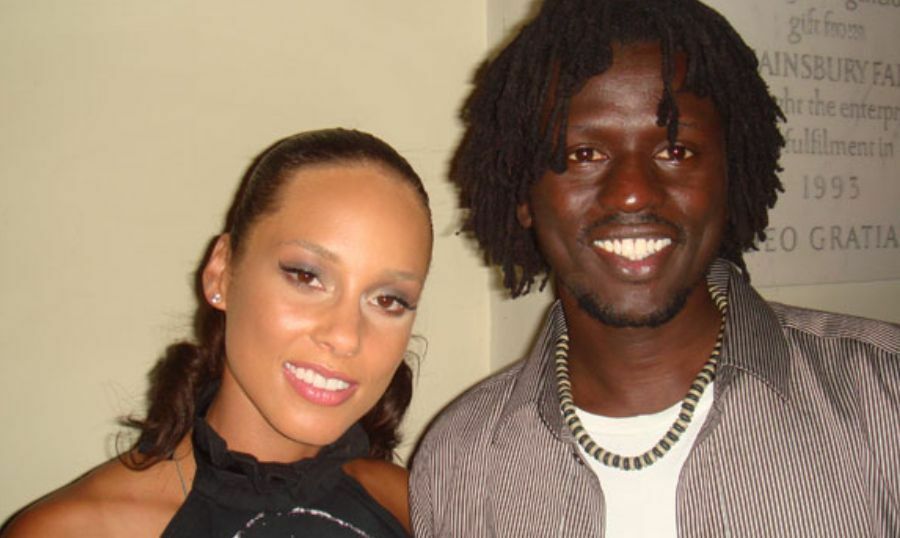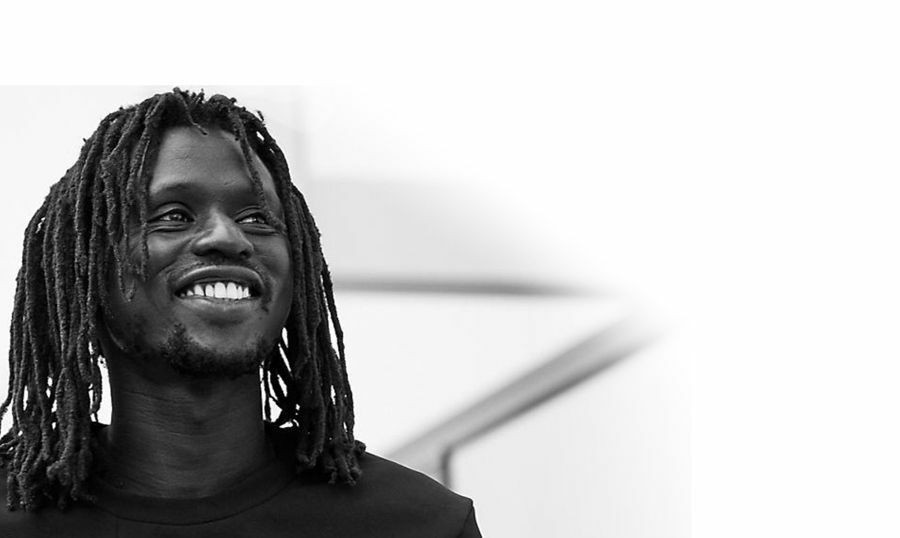On December 10 2019, he is speaking under the theme of “Triumphs” as part of the Insights Discussion Series, which is part of the Mandela: Struggle For Freedom Exhibition at Meridian Arts Centre in Toronto.
What was life like for you before the war?
Emmanuel: It was simple. Before, I couldn't remember anything but when I became conscious about what was happening, it was like hell broke on us. I didn't understand because my parents practically shielded me from what was going on; but, it was too late because I was growing and could observe. The first time I actually witnessed what suffering was, was when I went deep into South Sudan. I was seeing homes getting burned, people getting killed, people running from one place to another, and seeing dead bodies rotting on the floor. The images, those images are still in my head up to now.
You were so young, what impact did all of this have on you?
Emmanuel: In my experience, the war broke the soul of my family and village. All my aunties died during the war. All my uncles were taken by the war. My mom was claimed by that war. As a young kid in our own area, we kept running from one place to another. I could remember an image of a whole family chopped up, and they were burned inside. My aunt was raped in front of me. Young girls are especially vulnerable, they could be sex slaves if they are caught. They could also be used for carrying weapons to the battlefield. As for little boys, they could be taken as child soldiers. But most of the child soldiers are recruited by their own. The adults recruit you to fight their fight. When I became a child soldier, I was told I'm going to go to school. The violence itself, when you have a gun in your hand, it's fun. The beat of the AK-47 is exciting. In the bottom of your soul you are afraid but once you fire it and you are with other people, that collective courage coming with that energy, you forget that you are a child. But when the guns are quiet and the friends you are laughing with are gone, you think they are going to come tomorrow but now they are gone, you start believing a story that's not real. You think they are going to come back to life, and now that haunts you later. The part that I don't like the most is when the guns cool down. You get to hear the cry of young boys. They were men when they were fighting; but now that they are injured, they become children. You see broken limbs and bones sticking out. There are no painkillers. So how do they treat it? It has to be done raw before the Red Cross comes. You can hear groaning through the night, babies crying. It is horrifying to see so many people injured and there are no doctors or treatment. Those images are stuck in my head for life.
I remember we had to run for days. It's exhausting because you are thinking I'm going to get caught. I remember I collapsed while walking because I didn't sleep for days. My body collapsed and sleep snatched me. Imagine you are walking and you just fall down? The effects of war are visible later because war is planned. The people who have the upper hand, if they want to control you for years to come, they have to make you bitter. They have to make you angry. They have to put you in a situation where maybe you aren't able to retaliate, and that's when they can program you for generations to come. So that is called trauma. The thing that causes trauma to stay is bitterness. When you are bitter, it's hard for the trauma to heal.
When I was rescued to a safe environment, I began to see the secondary war. The first war I experienced, I was in a survival state. I could make certain decisions. But now I'm in a situation where my mind plays things that I have no control of. You can have a flashback that takes two to 12 seconds in your mind, and you're stuck in the moment of what happened in the past. When you are stuck in that, what happens after is that your entire body hurts. Now your body pushes you into isolation where depression could kick in. Now at school how did that impact me? I was called a problematic kid because something is happening in my mind. I'm not concentrating in class, and they tell me I'm a stubborn kid. So I get kicked out of school. I wished a teacher would have asked me, "young man what is in your head?"
Bitterness is holding your heart, and trauma is holding your mind. The joy in your heart is crumbled, and your peace of mind is stolen from you. How did it cripple me? I had to repeat a class four times, one class four times. It doesn't mean I'm not smart. It's because my mind is occupied, and a traumatized mind can't think beyond a month, beyond a year, or plan, or strategize. The space in your mind is occupied by the events of the past, and now you have to create space.
If you ask me what is war? Every person has a different experience. I could look at Africa, right now we claim we are independent; but we are not because we still have events of the past. We haven't begun to heal ourselves and reprogram ourselves to who we are supposed to be. So we have leaders that have not even reprogrammed themselves so they have been programmed to hate their own. We only think for the moment so the poverty that is in the mind is part of the trauma. If you want to cripple people for generations, take their mind away from them. We are wealthy but still poor. Why? Like my country now, there is no peace. They are killing each other. People in power are replicating the same system that was given to them. The effect of war can haunt people for generations. If you look at the African Americans, all the children of slaves who were stolen, very few of them have really recovered and healed to grasp their lives, plan, think ahead, and organize themselves. There is self destruction here. There are young people killing other young people who are their own. Then back at home we have child soldiers. We are just killing each other because we can't heal. We understand love, we know what it is but when love comes we don't understand it. We want peace but when peace comes we don't understand it. If there is no system put in place to help people reprogram themselves for the future, then it just replicates itself in a way that's not visible but it's happening.
How did you handle freedom? (A British aid worker Emma McCune, helped Jal escape by smuggling him into Kenya when he was 12 years old. He writes about his experience in his memoir War Child, and a documentary by the same name.)
Emmanuel: The freedom is dangerous too because you don't know it. I trusted soldiers more than other people. If somebody is nice to you, you wonder what they want. What are they planning to do? Why are they smiling? Why are they laughing? What's their plan? You want them to smile but you are still questioning. You want to exploit them, so you become manipulative. Traumatized people are manipulative. They exploit people. Also your mind cannot reason so you create drama were there shouldn't be one.
How did you begin to deal with the trauma?
Emmanuel: Well, it's a whole process. Nowadays I've created programs that I support people to use. One of the things I came to understand about trauma is that it occupies your mind. It's just a flashback and it occupies creative faculties. What I do now when a flashback comes, is that I actually appreciate it, I shelve a conscious space or it. And I say, "thank you for reminding me of the past." I just breathe in and out, and just wait for a while because when you react to the flashback, it begins to hit you hard. So the idea is not react to it, and allow the flashback just like any other thought that comes into your head. Then when you become conscious, you can direct your mind towards the right thing that you want. You must have a dream. What is that dream? What is that impact you want to create? And that's what you put in place of the trauma. So when the trauma comes in a flashback, you just allow it be and not react to it. Be grateful, and talk to yourself and say, "Thank you. We're in a safe situation now but thank you for reminding me about the past." You can use that story to do something. You can collect that energy to drive you forward. And the driving forward is that dream. What is it that you want to achieve? So your past experience will give you that energy to do it. What is the impact? The impact I wanted to create was to share my experiences for social emotional loving. I teach my mind by saying this is what I want. What happened is in the past; but this is where I want to go. So having a dream, knowing your purpose, and changing your environment allows you to reprogramme your mind faster. The trauma is worse when it is allowed to stay. It grows stronger with time. It is best when somebody who has a situation gets helped as fast as possible. If you take long, the trauma becomes stronger. I think I was lucky because I was given the opportunity, my environment was changed. I wanted to be part of a solution and so that's what I focus my energy on, to be part of change despite all of this.
You lost family, experienced pain as well as inflicted pain. How hard was it to forgive and to forgive yourself as well?
Emmanuel: Forgiveness is a journey. It's a process and it's a lifestyle a person has to live by. It's actually one of the most important principles if you want to be joyful. You have to learn how to forgive. Forgiveness is actually an act of purpose because it's like giving without expectation. So I had to train my heart to help me do so and when I did that, the flashbacks never became stronger. The forgiveness served as a reminder to hold me grounded to the path.
You refused to be a victim but a victor, where did you get that strength from?
Emmanuel: I think knowing my purpose, you know. Knowing your purpose and believing in that thing in your mind that you cannot actually prove, if people ask you, but it exists in your mind. It's just like Moses who believed there was a promised land. God showed him, and he couldn't prove it; but, he had to walk people there. So it's having that vision, having that dream, and knowing that you are here for a reason. When I look at it, every person who made an impact in the world went through hell. How can you make an impact if you've not gone through hell? It's the process. Now there is no shortcut. If you believe in God, no shortcut. You have to go through the training. The training is the real experience. My past was the training. If you look at Jewish people, they are so successful. They've gone through the training. Everybody hated them. Everybody was killing them, the Nazis and all of that. You look at Black people, we're still in the training. But by the time we understand and accept this training, be grateful for this experience we've been given, learn from the past and begin to plan for the future, nobody is ever going to step on our head again.
You are a successful recording artist sharing the stage with people like Alicia Keys, did you ever think you'd be where you are today?
Emmanuel: To me sometimes it's like I'm still dreaming. But what I know is that as a child, I wanted to go to America. I wanted to go to the country that was dropping maize from the sky to us. I wanted to go to the source of this place. As for Alicia Keys, I used to see her on TV and I was thinking, "Wow, this is amazing." I like reading the Bible and there's a quote that says your gift will take you before kings. So whatever it is that is placed in your heart, just give yourself thirty years. Think thirty years not like one month, even if you live on the street. There is a man called Tyler Perry and he is worth over 600 million. He bought a huge place in Atlanta and is setting up a studio. When he began as an actor, he would sleep in cars and sleep on people's couches. It continued for years but he believed and kept on going. I think that is how the universe tests us. You hold your vision in your mind, you hold your purpose in your heart, your mission in your hand and just keep going. I saw in my head that I'm going to be part of a solution and that's what I saw and that's what I pursue. The most important thing I had to focus on was creating habits that would allow me to get there. I lacked focus, I was lacking discipline, I had to gain confidence, I was lacking persistence, and so I had to get several habits with time. I now actually teach on reprogramming yourself. I created something called mylifeisart which is a 360 approach to life and a commitment to self development. It's about working inside yourself. Sometimes you have a vision, you have a dream but it's not going to happen if you don't have the habits to take you there. You are not doing the boring stuff. Ask yourself, what are the three things you are doing everyday to take you there?

You are using your influence to raise awareness about what's happening globally, why is that important to you?
Emmanuel: I'm not here because I love this place. I'm here because I'm a refugee. It takes you thirty to forty years to settle mentally to be in one place. My brothers and sisters, my cousins, my relatives, some of them are still at refugee camp. Wealth is built as a collective. It's not an individual thing. Any money I make is a drop in the ocean. So you're here, you have no family, you have no relatives, you have no community because your community is crippled by war, so you are just like a piece. You are hanging alone and anything can happen to you. I'm like their agent so I look at myself as the stress of my father, the tears of my mother, the worries of my grandfather, the pain and joy of my grandmother, the voice of my brothers and sisters, the dreams and the hope of my ancestors, and the vision of those whose bodies became fertilizers for the tree of freedom. I'm representing them here so that's the way I look at it. I could go home and stay but the government doesn't like me, so I'll probably go back when I'm of no value for them to kill. But I'm mostly focusing on young people, finding opportunities for them to go to school and for mentorship. I'm focusing more on education. I'm not doing water or this and that. We've been drinking dirty water and survived all those years. The most important thing is education and opening our minds. The real stuff that could really transform Africa, nobody is focusing on. We only focus on things that don't take us ahead. Who is going to solve our problem? Us.
You are a perfect example of your past not determining your future. For those who believe their past has marred their future, what do you tell them?
Emmanuel: Well, it depends on what they believe. If you believe your future will be messed up, you will attract that. So we are the ones who curse ourselves. What you tell yourself alone is what really matters. It's not what you are telling people in the public. What is going on when you are alone? What are you telling yourself in your head? It's the questions you ask yourself and what you tell yourself to do next that matter. What I'd tell a young person is, what did you desire as a kid? Go back to that moment because our hearts know what we want when our minds are messed up. If you want to help your community, if you want to be an entrepreneur, or if you want to be a lawyer, what is it? You can make an impact. You don't have to go to school. You can still make an impact. I'm here because of my thinking. So what is it that you have that's going to make people attracted to you? If you have nothing at all, find someone and volunteer. In the process, as they succeed, they will pull you along, and as you go on, you will begin to discover yourself too, and you can start your own thing.
For more information on Emmanuel and his upcoming events, visit: www.emmanueljal.com
If you would like to sponsor or donate to Gua Africa- www.gua-africa.org, contact This email address is being protected from spambots. You need JavaScript enabled to view it. .

 By
By 





